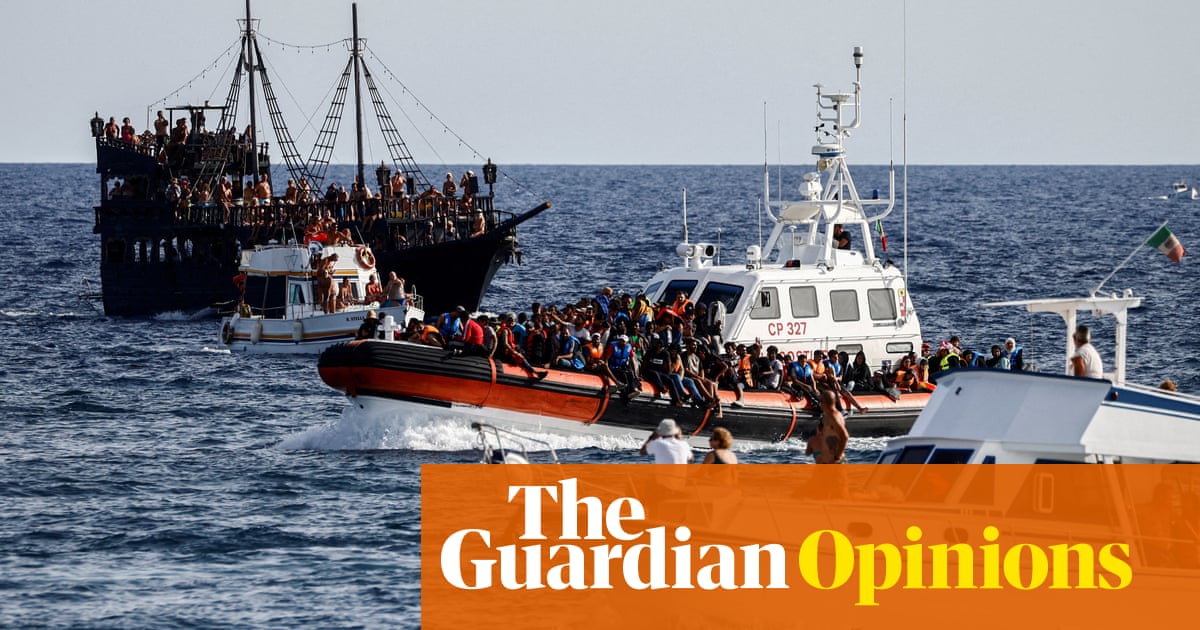
What, exactly, is the difference between “illegal” migration and colonization?
Unsurprisingly, perhaps, this is a question that few have bothered to ponder in the heated migration “debates” that have dominated politics and elections across the Western world over recent months.
But the answer is simple: timing.
The era of European colonization and the migration “crises” gripping Europe and America today are so closely related that ignoring the links between the two is to guarantee that any policies designed to come to grips with the 21st century’s south-north migration phenomenon will inevitably lack empathy and compassion.
Which brings us to the EU’s new Migration and Asylum Pact. Adopted by the Council of the European Union in April after three years of turbulent negotiations with the 27 member states, it is designed to establish “an effective, humanitarian and safe European migration policy,” to be applied evenly across Europe.
Such has been the influence on the negotiations of the many European leaders who have won power on the back of opportunistic pledges to quell migration that human rights groups fear the effect of the pact will be to further dehumanize Europe’s treatment of migrants.
In a joint open letter sent to the EU, 50 nongovernmental organizations said the pact will merely “mirror the failed approaches of the past and worsen their consequences.” It will, they add, lead to “an ill-functioning, costly and cruel system that … will normalize the arbitrary use of immigration detention, including for children and families, increase racial profiling, use ‘crisis’ procedures to enable pushbacks and return individuals to so-called ‘safe third countries,’ where they are at risk of violence, torture and arbitrary imprisonment.”
Everywhere in the West, migrants are being demonized in the interests of political gain.
Across Europe, populist parties exploiting the xenophobic and racist prejudices harbored by sections of the population that feel neglected by political elites have made significant gains in national and European elections. This is largely thanks to the time-honored tactic of encouraging voters to blame foreigners for all their woes.
In the US, as the country heads toward the November presidential showdown between Donald Trump and Kamala Harris, the traditionally liberal Democrats have found the need to portray their candidate, the daughter of immigrants from India and Jamaica, as “tough as nails” on illegal immigration.
The US Border Patrol had more than 2 million encounters with migrants illegally crossing America’s southwest land border in 2023 and the Republicans are gleefully accusing the Biden administration of having dropped the ball.
The moral panic over migration currently engulfing Western politics is founded on rank hypocrisy.
Jonathan Gornall
In fact, the seemingly unwanted immigrants are coming because Americans need them. As libertarian think tank the Cato Institute recently concluded, “most of the increase in illegal immigration can be blamed on the strength of the labor market rather than the administration’s tinkering with border enforcement policies.”
American businesses, short of domestic labor for the jobs that few Americans want to do, are quietly exploiting the up-to-tenfold wage differential between the US and some Latin American countries, and statistics show that the number of illegal crossings rises and falls in harmony with the demand for labor.
In the UK, excluded from the EU’s migration policies since Brexit, the last government fell in July in large part because it failed to keep its populist pledge to “stop the boats.” This was a ludicrous overreaction to a trickle of migrants seeking sanctuary or a working future in a country to which many have been drawn precisely because of its buccaneering imperialist past.
The moral panic over migration currently engulfing Western politics is founded on rank hypocrisy. Almost every one of the European nations now determined to make life even more difficult for the tens of thousands who annually seek a new life in Europe spent several hundred years dispatching countless thousands of their own people to seek new lives and fortunes in other people’s lands.
Some were fleeing religious or political persecution. Others were hoping to break free of poverty and to build a new life. Remind you of anyone?
In America, the ancestral origin of all but one of its 46 presidents over the past 234 years can be traced to a generationally recent act of migration from Europe. Trump, currently threatening mass deportation of illegal residents should he return to power, is the grandson of Friedrich Trump, who came to America in 1885 to avoid conscription in his native Bavaria.
Some Western historians still refer to the period of aggressive European expansion euphemistically as the “Age of Discovery.” To those on the receiving end of being “discovered,” the appearance on the beach of a ship’s longboat, packed to the gunwales with armed men, would have been as welcome as one of the overcrowded rubber boats full of desperate men, women and children that have landed regularly on Britain’s English Channel shore throughout this summer.
Doubtless the Native Americans who watched the Pilgrim Fathers row ashore from the Mayflower in 1620 would have also liked to “stop the boats.”
All over the world, for hundreds of years, flags were planted and land was claimed for this European empire or another, without any thought for the wishes or welfare of the locals. The flag planters saw themselves as colonists. To the colonized, however, they were illegal migrants.
The story of humankind is a story of movement, of the ebb and flow of peoples since the first early humans first ventured out of Africa, seeking a better life over the horizon. Ancestrally speaking, very few of us are from “here.”
England — where, for self-serving reasons, many politicians are so keen to keep out the foreigners upon whom industries from farming to healthcare rely — is the very definition of a nation created by mass immigration from Europe during the early Middle Ages. The very name, England, derives from the Angles, the Germanic people who flooded in after the Romans left, along with their neighbors, the Saxons.
Politicians such as Nigel Farage, the anti-immigrant architect of Brexit and a proud defender of Britain’s Anglo-Saxon heritage, choose not to dwell on the fact that the ancestors of at least a third of today’s English were the original boat people.
Europe and the US do have an immigration problem. But it is not, as so many of their voters are so easily and falsely persuaded, that these continents face being overrun and having their cultures subsumed. Rather, it is that they are in danger of forgetting their own stories, as the descendants of migrants and colonizers, and in the process are losing touch with their heritage — and their humanity.
Jonathan Gornall is a British journalist, formerly with The Times, who has lived and worked in the Middle East and is now based in the UK.












